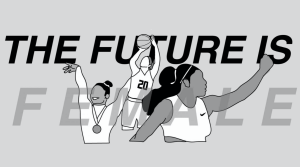“WAP”: Why it’s exactly what women need in 2020
October 16, 2020
Cardi B’s hit single “WAP” featuring Megan Thee Stallion blew its way through the charts and straight to the top promptly following its release early this past August. Like most chart-topping songs in this era, “WAP” found an immediate audience through the wildly popular video-sharing app TikTok. Unfortunately for Cardi, the public scrutiny of the song came just as quickly and out of the blue as the attention did.
It’s no secret that for as long as the music industry has existed, it has been notoriously pitted against women in many ways, whether it be the constant scrutiny of women’s body types, the sexualization of young girls without their explicit consent or the sweeping effects the #MeToo movement had on the industry. So, given the history, it’s easy to see how such a song would raise some eyebrows.
Influential people like conservative talk show host Ben Shapiro, California congressional candidate James P. Bradley and even one of the most iconic artists of the early 2000s, CeeLo Green, voiced negative opinions about the song. Yes, CeeLo Green, and no, the irony is not lost on me either.
As if the disparity in our treatment of men and women couldn’t get any more obvious, the entire song was written over top a sample track called “There’s Some Whores in this House,” written and produced in 1993 by Frank Ski (Frank Rodriguez), an esteemed rap/R&B producer, who, might I add, received zero pushback or scrutiny regarding the vulgarity of the lyrics. Yet another ode to the blatant sexism the industry boasts.
Additionally, many parents voiced concerns about the vulgar lyrics, suggestive dancing and raunchy costumes the song and its music video exhibit, all of which were fair concerns if they didn’t have one fatal, sexist flaw. “WAP” was hardly the first of its kind when referring to a song with overtly sex-positive lyrics written by a rap artist, but it was one the first of its kind when referring to overtly sex-positive lyrics written by a female, about a female.
These concerns were brought up by Australian radio show hosts Kyle Sandiland and Jackie O during their exclusive sit-down with Cardi herself. When asked to comment on the outpouring of backlash her song received, she pointed out that growing up in the Bronx surrounded her with music that may not have been considered age-appropriate in the average household. And when asked to comment on the concerns of parents, she had this to say:
“Of course I don’t want my child [Kulture Cephus, 2] to listen to this song. But it’s like for adults!” she clarified.
If media were censored such that everything was suitable for children, our world would be robbed of some of the most important stories, songs and artwork of our time. The thing is, media isn’t censored in that way and hasn’t ever been. Yet again, I feel the need to circle back to the idea of sexism. History has shown that the entertainment industry has never been one to shy away from risqué language and action, but freedom from censorship hasn’t ever been fully granted to women. Consider Janet Jackson’s public shaming after an unfortunate wardrobe malfunction at the Super Bowl that could be directly compared to the blind eye that was turned after Adam Levine deliberately tore off his shirt at the same event years later, or Cardi B and Meg Thee Stallion receiving hate from all angles for their song that was produced using a sample track of equal vulgarity but written by a man.
So, to the parents worried about corrupting their kids with the vulgarity of female sexuality, set some parental controls on your child’s phone. And to the rest of you, I highly suggest bringing a bucket and a mop, because this bad-ass feminine anthem is here to stay.


